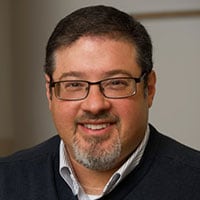I suspect it's an early memorable lesson for nearly all of us. You're 15 seconds into the incredible promise of a stick of juicy gum only to find the taste has already vaporized.
We tend to become appropriately skeptical of the world of advertising early on, understanding that commercials misrepresent reality.
But what about the news that we consume?
Today, fundamental rifts exist over the source of our news and how these sources may have their own biases and agendas that shape, filter, even spin, our own views.
We might hope that science and medicine are above these biases, but that is not always the case.
We would be wise to recognize these agendas and biases. At least in the case of the monthly "throw-away journals" coming to our offices, thick with glossy pharma advertisements, it's evident that the slick ads are put out by companies to sell their products.
What I find more troubling are the articles highlighting new results in diagnostics or therapeutics that suggest a need to change practice, almost invariably adding a new test or treatment in a novel setting. Some of these stories masquerade as credible news but are written without balance and rigor, either accidentally or not.
Part of the problem stems from a demand for more news all the time, alongside lower budgets for specialist journalists with the knowledge to approach these topics with appropriate skepticism. We've ended up with a deluge of sensational stories that amplify and legitimize company talking points.
If we're not careful, some clinicians might accept this news at face value, especially when professional societies promote these stories. This can leave clinicians with the impression that these news stories have been sanctioned by respected leaders from our specialty.
Except too often, they're not.
In the Substack newsletter Sensible Medicine, Vinay Prasad, MD, and Adam Cifu, MD, described something called "churnalism" (part 1 and part 2). Churnalism, as the name suggests, characterizes the practice of media sources co-opting the spoon-fed conclusions of a press release or research study and reformatting it into an article without critical assessment.
Unfortunately, these types of stories are part of what passes for medical journalism today. A huge fraction of cancer news stories today follow the same format: A summary of the key findings likely included on a conclusion slide or press release, followed by a comment from the principal investigator about why the work is important.
This is the CliffsNotes approach to content creation, demanding the least time and effort. Asking a principal investigator to comment on the importance of their own work feels a lot like asking a parent whether their baby is adorable. Could anyone else be a more biased source of information on the question?
For example, let's look at this ASCO Post article about the rates of identified germline abnormalities among patients with cancer referred for germline testing. This article and all others that I saw covering this research suggested that we should now be doing germline testing on all patients with lung cancer.
However, the news coverage failed to provide the critical caveat that this work is not based on a general population but on a presumably highly enriched one comprised of patients already having a high suspicion of a germline mutation. This important yet overlooked distinction led to an inappropriate interpretation of the data, with commentary limited to a quote supporting this conclusion from the presenter.
These may be innocent errors of omission, reporting shortcuts, or a lack of understanding about the topic and the knowledge to ask hard questions.
But I think it's also important to acknowledge that there's a benefit to promoting a narrative of inexorable progress. These media sources generate revenue from sponsors who are advertising the same products being discussed in these news pieces. As faculty speaking at conferences, we are required to report our conflicts of interest, but we aren't necessarily privy to the institutional conflicts of professional societies, news outlets, or journals.
Of course, we can't always expect that cancer reporting will be done by an expert writer who can discern appropriate criticisms and counterpoints.
So what can we do?
First, we can turn on our "BS detectors" and become wiser consumers of content who are better able to recognize one-sided treatments of complex issues.
Next, we can use the open forum of social media as an opportunity for broader discussion. Reporters will benefit from this — even a cursory look on Twitter will raise critical caveats that go beyond the prepackaged, sponsor-written press release.
Do you think this issue has become worse because of the daily news cycle, or am I being too critical?
H. Jack West, MD, associate clinical professor and executive director of employer services at City of Hope Comprehensive Cancer Center in Duarte, California, regularly comments on lung cancer for Medscape. Dr West serves as web editor for JAMA Oncology, edits and writes several sections on lung cancer for UpToDate, and leads a wide range of continuing education programs and other educational programs, including hosting the audio podcast West Wind.
Follow Medscape on Facebook, Twitter, Instagram, and YouTube
Medscape Oncology © 2022 WebMD, LLC
Any views expressed above are the author's own and do not necessarily reflect the views of WebMD or Medscape.
Cite this: H. Jack West. Discerning Bias in Cancer News - Medscape - Nov 17, 2022.









Comments